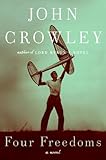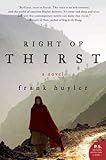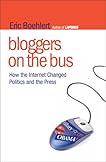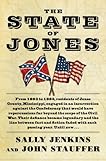by Dai Sijie (I didn't read Balzac and the Little Chinese Seamstress, but maybe I should read both)

Once on a Moonless Night is full of tales within tales and worlds within worlds, ranging from ancient Chinese empires through communist China to modern Beijing….Everything in all these interwoven tales is extreme, from intellectual obsession to the cruelty of empresses, from the mountain landscapes to cabbages….Sijie writes wonderful descriptions….There is always a sense of the pressure of numbers of people and things, which seems to provoke in the characters a ferocious determination to be individuals, to make their own fates, single-mindedly. Places and events are shocking….the reader feels a readerly excitement, even pleasure, as he or she is swept along from disaster to disaster.
- A.S. Byatt, The Guardian
Four Freedoms: A Novel (Hardcover)
by John Crowley (WWII fiction and Oklahoma, what more can I say?!)

From Booklist
*Starred Review* Although nominally about life at an American aircraft factory during World War II, Crowley’s complex and subtle novel is much grander. He explores the minds and hearts of people compelled by history to radically change their lives. Unaccountably optimistic Prosper Olander, orphaned as a child and crippled by a failed surgery, discovers that even he can find important work at a distant aircraft company in rural Oklahoma. Connie Wrobleski, frightened of nearly everything except her infant son, also travels to Oklahoma to reunite with her domineering husband, only to see him desert his family by enlisting. Prosper, Connie, and half a dozen other characters are developed in intricate detail and used as lenses on the massive relocation, dislocation, and societal change caused by the war. Crowley’s characters offer depth, nuance, and pathos to the traditional image of Rosie the Riveter. Four Freedoms is also a triumph of both research and imagination. Crowley’s aircraft company is an invention, but his detailed descriptions of sights, smells, and sounds in the plant, and his evocation of everyday life at home during WWII, are compelling. A wonderful novel that readers won’t soon forget. --Thomas Gaughan
Right of Thirst: A Novel
by Frank Huyler

From Publishers Weekly
Doctor-author Huyler offers in his first novel (after story collection The Laws of Invisible Things) a clear-eyed if occasionally overwrought exploration of grief and redemption in a refugee camp set in an unnamed mountainous Islamic country. After witnessing his wife's slow death, cardiologist Charles Anderson volunteers to be the doctor at a remote refugee camp set up in the aftermath of an earthquake. He is joined by Elise, a German geneticist studying the DNA of a mountain tribe, and Sanjit Rai, a local military officer assigned to protect the camp. As the days pass and the refugees fail to appear, Anderson questions the motivations of those who put him there and his own reasons for fleeing into the mountains, including his decision to not face his devastated son. Anderson's desire to heal becomes twisted up with the clash between east and west, rich and poor, as well as with regional conflict. The prose is sturdy and evocative in this perhaps too sincere and sentimental exploration of what limited power any given individual has to change the world. (May)
Bloggers on the Bus: How the Internet Changed Politics and the Press
by Eric Boehlert (Liberal bloggers, presidential elections, politics -- you betcha!)

From Publishers Weekly
Starred Review. Award winning journalist Boehlert (Lapdogs: How the Press Rolled Over for Bush) introduces the new generation of political muckrakers who took the 2008 presidential campaign-and old guard, by-the-numbers reporting-by storm. From the banner names of newly minted powerhouse The Huffington Post to the vitriol dished out by established liberal outposts like The Daily Kos, Boehlert presents a Web's-eye-view of the American left's grand reawakening. The netroots, as they became known, "literally kept the lights on during a very dark period for liberals"; prominent blogger Digby puts it more bluntly: "The Internet became available just as American politics turned crazy." That craziness only accelerated through the presidential campaign, including the polarizing campaign of Hillary Clinton, Obama calling small-town Pennsylvanians "bitter," and the entire shock-and-awry VP candidacy of Sarah Palin. Boehlert also examines the use and misuse of social networking sites like MySpace, and some seismic changes in televised news (including mainstream media's biggest new star, unlikely MSNBC news host Rachel Maddow). Blogger Markos describes his site as "a place for passionate activists, not conflict-averse weenies"; Boehlert illustrates that ethos well in this opinionated, impossible to put down narrative, chronicling with cagey insider detail the failures of copycat reporting and the inspired citizen-journalists picking up the slack.
The State of Jones
by Sally Jenkins, John Stauffer (Because I love Civil War history).

Amazon.com Review
Amazon Best of the Month, July 2009: Make room in your understanding of the Civil War for Jones County, Mississippi, where a maverick small farmer named Newton Knight made a local legend of himself by leading a civil war of his own against the Confederate authorities. Anti-planter, anti-slavery, and anti-conscription, Knight and thousands of fellow poor whites, army deserters, and runaway slaves waged a guerrilla insurrection against the secession that at its peak could claim the lower third of Mississippi as pro-Union territory. Knight, who survived well beyond the war (and fathered more than a dozen children by two mothers who lived alongside each other, one white and one black), has long been a notorious, half-forgotten figure, and in The State of Jones journalist Sally Jenkins and Harvard historian John Stauffer combine to tell his story with grace and passion. Using court transcripts, family memories, and other sources--and filling the remaining gaps with stylish evocations of crucial moments in the wider war--Jenkins and Stauffer connect Knight's unruly crusade to a South that, at its moment of crisis, was anything but solid. --Tom Nissley




























No comments:
Post a Comment